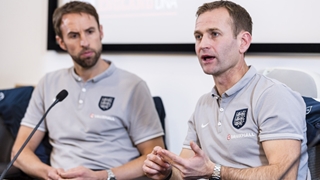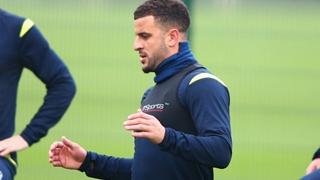
England Under-21s head coach Gareth Southgate, director of elite development Dan Ashworth and head of player and coach development Matt Crocker presented the new plans for the future of English football.
The announcement kicked off a big few days at the national football centre as the DNA will be launched to 1,500 coaches attending the three-day FA Licensed Coaches Club and Talent ID conferences.
Aimed at England’s youth teams from U15s through to Men’s Under-21s and Women’s Under-23s, the England DNA is the start point for The FA’s approach to elite player development.
The framework consists of five elements. The first, ‘who we are’, is about instilling pride in representing England and understanding the heritage of the Three Lions past and present.
‘How we play’ focuses on the playing style and philosophy, aimed at building possession domination, but also looking at teams without the ball and the transition between. The ability for teams to adapt and be flexible is also a target.
‘The future England player’ is about developing players with outstanding technical and tactical abilities as well as physical attributes and psychological and social characteristics. They are known as the four corners of The FA Development model.
‘How we coach’ looks at the way players are developed so there is a consistent approach to coaching across all the England teams and that training sessions are well-planned, delivered and reviewed.
‘How we support’ is about how players’ performance is backed up by analysis, sports medicine, psychology and nutrition.
The plan is to also produce a version of the DNA adapted for grassroots players and coaches, building on The Future Game book and coaching sessions.
The England DNA: Core elements
1 Who we are
English football has a rich football heritage and history which we want all England players to be aware and respectful of.
Before arriving at St. George’s Park the players will understand what is required to represent England – and an induction process will be shared with the players so they understand the ‘England way’.
Establishing a distinct and recognisable on and the off-field England culture, based on clear values and beliefs, is central to our DNA.
The backstories of players in the England setup are wide and varied with many players of multicultural background in our teams. The diversity of our England players is to be celebrated.
The process of awarding caps is going to be formalised across all age groups to help instil a better sense of pride and understanding in what it takes to become an England player.
Young England players will be exposed to a comprehensive and varied games programme as early as possible in their international career. Fixtures will take place against teams from around the world.
2 How we play
How England development teams play will be the strongest demonstration of the England DNA.
England teams aim to intelligently dominate possession selecting the right moments to progress the play and penetrate the opposition.
England teams aim to regain possession intelligently and as early and as efficiently as possible. All aspects of the out-of-possession philosophy will take into consideration the state of the game, the environment and pre-determined game-plan.
England teams sense changing moments in the game both in and out of possession reacting instinctively and intelligently.
England development teams will play with tactical flexibility, influenced by the profile of the players and the requirements of the match or competition
3 The future England Player
The core attributes and characteristics of the future England player, in all four corners of The FA player development model, are detailed and supported by eight position specific profiles: goalkeeper, full-back, central defence, defensive central midfield, central midfield, wide midfield, shadow striker, centre forward.
We hope to identify and develop future England players with the following core attributes and skills:
- Technical
Future England players will have the ability to create, score and prevent goals through excellence in: passing over varying distances, receiving skills, turning skills, travelling with the ball, attacking and defending skills, finishing skills, aerial ability. - Tactical
Future England players will be equipped with the skills, abilities and decision-making capability to tactically manage international games. We aim to produce England players who can: recognise and adapt to the state of the game, achieve winning performances by maximising strengths and exploiting weaknesses, understand and apply individual, unit and team roles and responsibilities, adopt varied playing styles and formations, perform effectively against varied playing styles and formations, deal with varied environmental conditions. - Physical
We aim to develop future England players who possess outstanding physical and athletic skills in the following areas: agility, balance, coordination, speed and speed endurance, endurance, flexibility, power, strength, physical resilience, recovery, nutrition and lifestyle. - Psychological
We aim to develop reflective, resourceful and resilient England players who display outstanding confidence, creativity, concentration, communication, control, commitment. - Social
Through the England experience we will help players develop the following outstanding social skills that are in line with our code of conduct - which has been in place for several years: behaviour, reflection, teamwork, relationships, accountability, responsibility, Independence, life-skills and player education
4 How we coach
All England training sessions are meticulously planned for and delivered using the England DNA Coaching Fundamentals. Crucially, every training session will be reviewed in order to review future coaching sessions.
All England training sessions are built on the following core principles:
- Use a positive and enthusiastic manner with players at all times
- Deliver realistic game-related practices
- Use games whenever possible in training
- Develop practices that enable the players to make lots of decisions
- Connect with the group before the session outlining the aims, objectives and learning outcomes
- All sessions should follow The FA Learning cycle (Plan-Do-Review). This is a coaching cycle that ensures players are aware before, during and after the session as to what is required
- Value and work equally across the FA four-corner model
- Spend equal time delivering, planning and reviewing
- Include elements of transition in all practices and sessions where possible
- Use a carousel approach in sessions so different practices are organised beforehand to allow players to maximise playing time in training
- Use varied coaching styles based on the needs of the group
- All sessions will ensure 70 per cent ball-rolling time
5 How we support the process
All aspects of a player’s England experience are supported by a range of specialist medical, scientific, analytical and psychological disciplines to enhance the coaching process, player and team performance.
These include: performance analysis, sports medicine and physiotherapy, performance psychology, physical performance and nutrition.
Find out more about England DNA, the playing and coaching philosophy of the England Teams.









